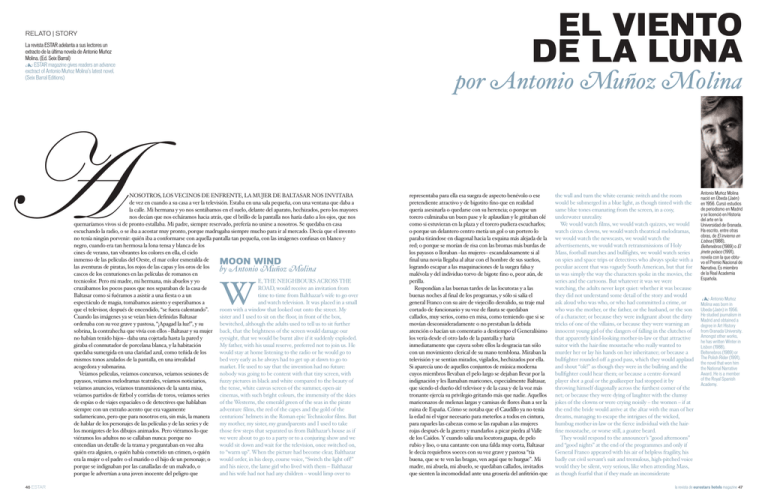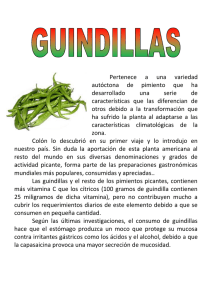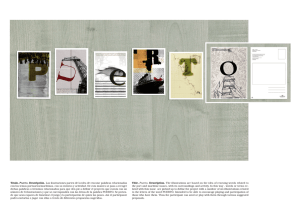Relato - Eurostars Hotels
Anuncio

A EL VIENTO DE LA LUNA RELATO | STORY La revista ESTAR adelanta a sus lectores un extracto de la última novela de Antonio Muñoz Molina. (Ed. Seix Barral) 3 ESTAR magazine gives readers an advance exctract of Antonio Muñoz Molina’s latest novel. (Seix Barral Editions) por Antonio Muñoz M0lina NOSOTROS, LOS VECINOS DE ENFRENTE, LA MUJER DE BALTASAR NOS INVITABA de vez en cuando a su casa a ver la televisión. Estaba en una sala pequeña, con una ventana que daba a la calle. Mi hermana y yo nos sentábamos en el suelo, delante del aparato, hechizados, pero los mayores nos decían que nos echáramos hacia atrás, que el brillo de la pantalla nos haría daño a los ojos, que nos quemaríamos vivos si de pronto estallaba. Mi padre, siempre reservado, prefería no unirse a nosotros. Se quedaba en casa escuchando la radio, o se iba a acostar muy pronto, porque madrugaba siempre mucho para ir al mercado. Decía que el invento no tenía ningún porvenir: quién iba a conformarse con aquella pantalla tan pequeña, con las imágenes confusas en blanco y negro, cuando era tan hermosa la lona tensa y blanca de los cines de verano, tan vibrantes los colores en ella, el cielo inmenso de las películas del Oeste, el mar color esmeralda de MOON WIND las aventuras de piratas, los rojos de las capas y los oros de los by Antonio Muñoz Molina cascos de los centuriones en las películas de romanos en E, THE NEIGHBOURS ACROSS THE tecnicolor. Pero mi madre, mi hermana, mis abuelos y yo ROAD, would receive an invitation from cruzábamos los pocos pasos que nos separaban de la casa de time to time from Balthazar’s wife to go over Baltasar como si fuéramos a asistir a una fiesta o a un and watch television. It was placed in a small espectáculo de magia, tomábamos asiento y esperábamos a room with a window that looked out onto the street. My que el televisor, después de encendido, “se fuera calentando”. sister and I used to sit on the floor, in front of the box, Cuando las imágenes ya se veían bien definidas Baltasar bewitched, although the adults used to tell us to sit further ordenaba con su voz grave y pastosa, “¡Apagad la luz!”, y su sobrina, la contrahecha que vivía con ellos –Baltasar y su mujer back, that the brightness of the screen would damage our eyesight, that we would be burnt alive if it suddenly exploded. no habían tenido hijos– daba una cojetada hasta la pared y My father, with his usual reserve, preferred not to join us. He giraba el conmutador de porcelana blanca, y la habitación would stay at home listening to the radio or he would go to quedaba sumergida en una claridad azul, como teñida de los bed very early as he always had to get up at dawn to go to mismos tonos azulados de la pantalla, en una irrealidad market. He used to say that the invention had no future: acogedora y submarina. nobody was going to be content with that tiny screen, with Veíamos películas, veíamos concursos, veíamos sesiones de fuzzy pictures in black and white compared to the beauty of payasos, veíamos melodramas teatrales, veíamos noticiarios, the tense, white canvas screen of the summer, open-air veíamos anuncios, veíamos transmisiones de la santa misa, cinemas, with such bright colours, the immensity of the skies veíamos partidos de fútbol y corridas de toros, veíamos series of the Westerns, the emerald green of the seas in the pirate de espías o de viajes espaciales o de detectives que hablaban adventure films, the red of the capes and the gold of the siempre con un extraño acento que era vagamente centurions’ helmets in the Roman epic Technicolor films. But sudamericano, pero que para nosotros era, sin más, la manera my mother, my sister, my grandparents and I used to take de hablar de los personajes de las películas y de las series y de those few steps that separated us from Balthazar’s house as if los monigotes de los dibujos animados. Pero viéramos lo que we were about to go to a party or to a conjuring show and we viéramos los adultos no se callaban nunca: porque no would sit down and wait for the television, once switched on, entendían un detalle de la trama y preguntaban en voz alta to “warm up”. When the picture had become clear, Balthazar quién era alguien, o quién había cometido un crimen, o quién would order, in his deep, course voice, “Switch the light off!” era la mujer o el padre o el marido o el hijo de un personaje; o and his niece, the lame girl who lived with them – Balthazar porque se indignaban por las canalladas de un malvado, o and his wife had not had any children – would limp over to porque le advertían a una joven inocente del peligro que 46 ESTAR W representaba para ella esa suegra de aspecto benévolo o ese pretendiente atractivo y de bigotito fino que en realidad quería asesinarla o quedarse con su herencia; o porque un torero culminaba un buen pase y le aplaudían y le gritaban olé como si estuvieran en la plaza y el torero pudiera escucharlos; o porque un delantero centro metía un gol o un portero lo paraba tirándose en diagonal hacia la esquina más alejada de la red; o porque se morían de risa con las bromas más burdas de los payasos o lloraban –las mujeres– escandalosamente si al final una novia llegaba al altar con el hombre de sus sueños, logrando escapar a las maquinaciones de la suegra falsa y malévola y del individuo torvo de bigote fino o, peor aún, de perilla. Respondían a las buenas tardes de las locutoras y a las buenas noches al final de los programas, y sólo si salía el general Franco con su aire de viejecillo desvalido, su traje mal cortado de funcionario y su voz de flauta se quedaban callados, muy serios, como en misa, como temiendo que si se movían desconsideradamente o no prestaban la debida atención o hacían un comentario a destiempo el Generalísimo los vería desde el otro lado de la pantalla y haría inmediatamente que cayera sobre ellos la desgracia tan sólo con un movimiento clerical de su mano temblona. Miraban la televisión y se sentían mirados, vigilados, hechizados por ella. Si aparecía uno de aquellos conjuntos de música moderna cuyos miembros llevaban el pelo largo se dejaban llevar por la indignación y les llamaban maricones, especialmente Baltasar, que siendo el dueño del televisor y de la casa y de la voz más tronante ejercía su privilegio gritando más que nadie. Aquellos mariconazos de melenas largas y camisas de flores iban a ser la ruina de España. Cómo se notaba que el Caudillo ya no tenía la edad ni el vigor necesario para meterlos a todos en cintura, para raparles las cabezas como se las rapaban a las mujeres rojas después de la guerra y mandarlos a picar piedra al Valle de los Caídos. Y cuando salía una locutora guapa, de pelo rubio y liso, o una cantante con una falda muy corta, Baltasar le decía requiebros soeces con su voz grave y pastosa “tía buena, que se te ven las bragas, ven aquí que te hurgue”. Mi madre, mi abuela, mi abuelo, se quedaban callados, invitados que sienten la incomodidad ante una grosería del anfitrión que the wall and turn the white ceramic switch and the room would be submerged in a blue light, as though tinted with the same blue tones emanating from the screen, in a cosy, underwater unreality. We would watch films, we would watch quizzes, we would watch circus clowns, we would watch theatrical melodramas, we would watch the newscasts, we would watch the advertisements, we would watch retransmissions of Holy Mass, football matches and bullfights, we would watch series on spies and space trips or detectives who always spoke with a peculiar accent that was vaguely South American, but that for us was simply the way the characters spoke in the movies, the series and the cartoons. But whatever it was we were watching, the adults never kept quiet: whether it was because they did not understand some detail of the story and would ask aloud who was who, or who had committed a crime, or who was the mother, or the father, or the husband, or the son of a character; or because they were indignant about the dirty tricks of one of the villains, or because they were warning an innocent young girl of the dangers of falling in the clutches of that apparently kind-looking mother-in-law or that attractive suitor with the hair-fine moustache who really wanted to murder her or lay his hands on her inheritance; or because a bullfighter rounded off a good pass, which they would applaud and shout “olé!” as though they were in the bullring and the bullfighter could hear them; or because a centre-forward player shot a goal or the goalkeeper had stopped it by throwing himself diagonally across the furthest corner of the net; or because they were dying of laughter with the clumsy jokes of the clowns or were crying noisily – the women – if at the end the bride would arrive at the altar with the man of her dreams, managing to escape the intrigues of the wicked, humbug mother-in-law or the fierce individual with the hairfine moustache, or worse still, a goatee beard. They would respond to the announcer’s “good afternoons” and “good nights” at the end of the programmes and only if General Franco appeared with his air of helpless fragility, his badly cut civil servant’s suit and tremulous, high-pitched voice would they be silent, very serious, like when attending Mass, as though fearful that if they made an inconsiderate Antonio Muñoz Molina nació en Úbeda (Jaén) en 1956. Cursó estudios de periodismo en Madrid y se licenció en Historia del arte en la Universidad de Granada. Ha escrito, entre otras obras, de El invierno en Lisboa (1988), Beltenebros (1989) o El jinete polaco (1991), novela con la que obtuvo el Premio Nacional de Narrativa. Es miembro de la Real Academia Española. 3 Antonio Muñoz Molina was born in Ubeda (Jaén) in 1956. He studied journalism in Madrid and obtained a degree in Art History from Granada University. Amongst other works, he has written Winter in Lisbon (1988), Beltenebros (1989) or The Polish Rider (1991), the novel that won him the National Narrative Award. He is a member of the Royal Spanish Academy. la revista de eurostars hotels magazine 47 RELATO | STORY EL VIENTO DE LA LUNA MOON WIND no pueden reprobar en voz alta. Su mujer, su sobrina, le reñían, pero a él le daba la risa, despatarrado y rebosando el sillón de mimbre donde se sentaba para ver la televisión o para tomar el fresco por las noches, la cara y la gran papada rojiza temblando con las carcajadas, los ojos muy pequeños, entornados, brillando bajo los párpados muy carnosos que no tenían pestañas. – Pero Baltasar, qué va a pensar la muchacha de esas cosas que le dices. – Si no me oye, so tonta. – Y tú qué sabes si nos oye o no nos oye. – Cómo va a oírnos, si no está aquí. – Tampoco estamos nosotros donde está ella y bien que nos mira y nos habla y oímos lo que dice. – Porque tiene micrófono. ¿Tenemos nosotros un micrófono? – ¿Y qué es un micrófono, tío? – Para qué hablaréis, si no sabéis nada. Nos quedábamos hasta el final del último programa, mi hermana a veces dormida sobre mis rodillas, la mayor parte de los adultos roncando, con las bocas abiertas, salvo la sobrina coja, mi madre y yo, que no nos cansábamos de ver películas ni sabíamos apartar los ojos de la pantalla, del resplandor azul que irradiaba de ella a través del papel de gasa transparente que la cubría y llenaba la habitación de una penumbra acuática. Al final salía un cura de sotana negra rezando un padrenuestro, y después la bandera de España ondeante con un águila negra en el centro y la fotografía del general Franco, vestido de uniforme, y de pronto la pantalla se quedaba en negro, y luego aparecía como un temblor de copos de nieve o de puntos luminosos que también nos hechizaba. Nos quedaba una sensación rara, de fraude o congoja, como si no pudiéramos aceptar que el mundo en el que durante horas habíamos tenido fijados los ojos y ocupaba hipnóticamente la atención ya no tuviera nada más que ofrecernos. Se espabilaban los adultos, Baltasar bostezaba abriendo las dos ranuras de sus ojillos y tal vez se volvía de costado y se tiraba un pedo brutal, porque al fin y al cabo era el dueño de la casa, del televisor y del sillón de mimbre, así como de varios miles de olivos y no se sabía de cuántos miles de duros guardados en el banco, y hacía en sus dominios lo que le daba la gana. Nosotros, los invitados menos prósperos que él, los que habíamos recibido el favor de que nos dejaran ver la televisión, nos quedábamos callados, haciendo como que no habíamos escuchado ni olido nada. 48 ESTAR La expectativa de un adolescente ante la vida y el desfase sociológico de la España del franquismo se entrelazan en la narración de El viento de la Luna con un hecho que fascina a su protagonista: en el verano de 1969, el hombre pisa por primera vez la Luna. Apagaban el aparato y de la pantalla cubierta con papel azulado se desprendía un tenue chisporroteo de electricidad estática. Había que apagar 3 The expectations la televisión, desde luego, pero también of an adolescent facing el transformador con su piloto rojo, y life and the sociological hasta desconectaban el enchufe de la gap of Franco’s Spain are intertwined in the corriente, no fuera a ser que el rayo temido acabara cayendo, que saltara una narration of Moon Wind with a happening that chispa y se provocara un incendio. fascinates its protagonist: Man, for the first Decíamos buenas noches, salíamos a la time in the summer of realidad conocida de nuestra plaza, a la 1969, sets foot on the penumbra mal iluminada por la Moon. bombilla de la esquina, cruzábamos unos pasos y ya estábamos en nuestra casa. Yo advertía entonces que nuestro llamador era de hierro, no de bronce dorado ni de oro macizo, como me parecía el de Baltasar, y que nuestro portal, en vez de baldosas relucientes, tenía guijarros de empedrado, y en nuestro zaguán no había un zócalo de azulejos, y ya se notaba el olor del fuego de leña y la ceniza enfriada y el estiércol de los animales en la cuadra. Observaba con ojos atentos esos detalles, pero no sentía amargura, ni hubiera deseado cambiar mi casa por la de Baltasar, aunque me diera envidia su televisor: me intrigaba la docilidad y el silencio de mis abuelos en cuanto entraban en aquella casa, y cuando volvíamos a la nuestra espiaba adormilado sus conversaciones. Escuchaba sus voces llenas de cautela al mismo tiempo que sus pasos cuando subían las escaleras hacia los dormitorios. – Qué vergüenza, ya no pienso volver más a esa casa. – Mujer, si nos invitan, no vas a tener la mala educación de no ir. – Mala educación la de ellos, que sólo les falta escupirnos. Y los humos de la buena señora, “hay que ver la mala suerte de que vosotros no hayáis podido comprar una televisión, con lo que se ve que os gusta”. – Tienen dinero y nosotros no. – Tienen dinero porque se lo han robado a otros. – No empieces con lo mismo. – Dile que te devuelva lo que era tuyo. Lo que me habría hecho falta para que comieran nuestros hijos. – También nosotros tuvimos hijos y ellos no. ¿Es que eso no es desgracia? – Dios castiga. Aunque parezca que tarda o que no se da cuenta. Dios acaba dándole a cada uno lo suyo. movement or did not pay diligent attention or made some commentary out of line, the “Generalissimo” would see them from the other side of the screen and would immediately cause misfortune to fall on them with just a gesture of his tremulous hand. They would watch the television and feel watched themselves, guarded, bewitched by it. If one of those groups appeared playing modern music whose members wore their hair long, they would be overcome with indignation, shouting insults at them, particularly Balthazar who, being as he was the owner of the television and the house and possessing the most thunderous voice, he exerted his privilege shouting loader than anyone else. Those sissies with long hair and flowery shirts were going to be Spain’s ruin. Couldn’t one just tell how the “Caudillo” no longer had the age or vitality to make them toe the line, to shear their heads just like they had shorn the red women after the war and sent them to cut stones at the Valley of the Fallen. And when a pretty announcer appeared, with her straight blond hair, or a singer wearing a very short skirt, Balthazar would mumble vulgar complimentary remarks with that deep, course voice of his: “Hey gorgeous, your knickers are showing, come here and let me fix you!” My mother, my grandmother, my grandfather did not utter a word; guests suffering embarrassment before the rudeness of a host they were unable to openly reprimand. His wife, his niece, both scolded him, but he would just roar with laughter, legs wide apart and sprawled over the wicker armchair he always sat in to watch television or take outside to cool off at night-time, his face and large, ruddy double chin wobbling with the guffaws of laughter, his eyes almost hidden, half-shut, shining beneath thick eyelids with no lashes. - Balthazar, whatever will that girl think of the things you are saying to her! - Well, she can’t hear me, silly! - How do you know if she can hear you or not? - How can she hear us, she’s not here! - Well, we’re not there where she is and she’s looking at us and talking to us and we hear what she is saying. - That’s because she has a microphone. Do we have a microphone? - And, what’s a microphone, Uncle? - Why do you bother talking, you don’t know a thing! We would stay until the end of the last programme, my sister sometimes asleep on my knees, most of the adults snoring with their mouths open, except the lame niece, my mother and myself, who never tired of seeing films nor could we tear our eyes away from the screen, from the blue shimmer that emanated from it through the transparent gauze that covered it and filled the room with an aquatic twilight. At the end, a priest attired in a black cassock would appear reciting “Our Father”, followed by the gently swaying Spanish flag with the black eagle in the middle and a photograph of General Franco in uniform and then, all of a sudden, the screen would go black, after which a shaky sprinkle of snowflakes would appear, or luminous spots that also kept us mesmerized. We were left with a strange sensation, of fraudulence or anguish, as though we could not accept that the world on which we had glued our eyes and hypnotically fixed our attention had then nothing more to offer. The adults would start to wake up, Balthazar would yawn, unsticking the two slits of his little eyes and perhaps would shift over to one side and let off a brutal fart because, after all, wasn’t he the owner of the house, the television and the wicker chair, as well as several thousand olive trees, who knows how many thousands in the bank and in his own domains could do whatever he felt like doing? We, the guests, less prosperous than him, we who had been favoured by being allowed to watch the television, remained silent, pretending we had heard or smelled nothing. The television was turned off and the screen covered with bluish paper would give off a little crackle of static electricity. Indeed, the television had to be turned off, but also the transformer with its red pilot light and they would even pull out the plug in case a stray streak of lightening should fall, causing a spark to fly that could cause a fire. We would say good-night to each other, emerging into the familiar reality of our square, the shadows scarcely lit by the lamp on the corner, we would take a few steps across and then we were home. It was also then that I noticed that our door-knocker was made of iron, not brass or solid gold, like Balthazar’s, or so it had seemed to me; that our front lobby instead of shiny floor tiles was paved with rough stones and that our hallway was not adorned with a frieze of tiles and one could catch the smell of a wood fire and cold ashes and the dung of the animals in the stable. I observed all those details with attention, although I did not feel any bitterness, nor would I have wanted to exchange my house for Balthazar’s, even though I envied his television. I was intrigued by the docility and silence shown by my grandparents when they entered that house and when we returned to ours, I would sleepily eavesdrop on their conversations. I would listen to their cautious voices as they climbed upstairs to the bedrooms. - What a disgrace, I’m never going back to that house! - My dear, if they invite us, you are not going to be so badmannered as not to go. - Take them for bad manners, all that was left was to spit on us! And the airs of that woman, “What bad luck you haven’t been able to buy a television seeing how much you like it!” - They have money and we don’t. - They have money because they have stolen it from other people. - Don’t start off again. - Tell them to give back what was yours. What I could have done with to feed our children. - We had children and they didn’t. Isn’t that enough bad luck? - God will punish. Even though it seems to take time or that things go unnoticed. God will finally give each and everyone his due. la revista de eurostars hotels magazine 49






